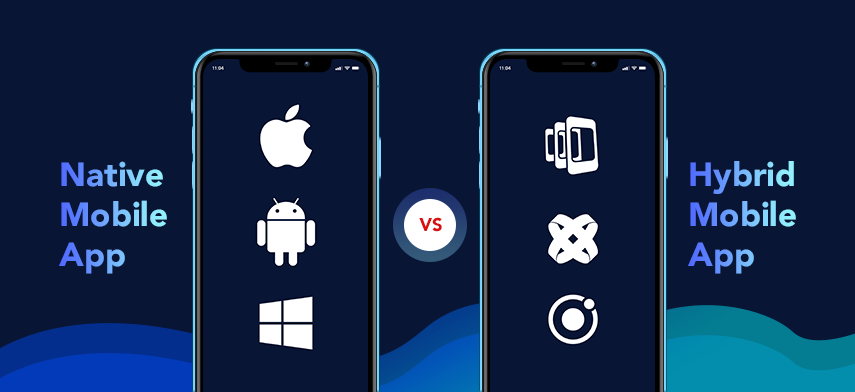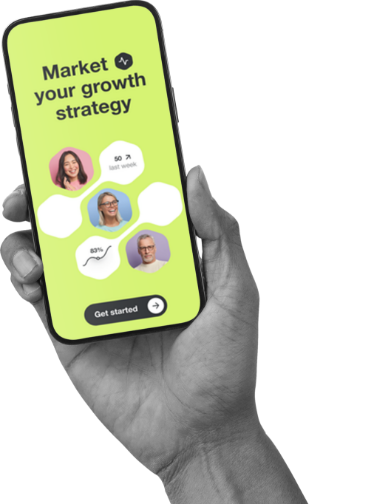Now that we live in the age of smartphones and other mobile devices, mobile apps have become an integral part of our daily lives. They have dramatically altered the ways in which we interact socially, conduct business, and gain knowledge. With millions of apps already available, companies of all sizes are investing in app development to reach customers and maintain a competitive edge. However, there is an ongoing debate over two approaches of building apps: hybrid and native.
This article will help you decide between Hybrid app development and Native app development by explaining the key differences between the two.
What is the Difference Between Hybrid & Native App Development?
The main aspects that differentiate Hybrid and Native app development are:
| Hybrid | Native |
| Programming Language | |
| Web technologies such as HTML, CSS, and JavaScript are used in hybrid apps. | Languages like Swift and Objective-C for iOS app development, and Java and Kotlin for Android, are used in the development of native apps. |
| Cost (Code Reusability) | |
| Hybrid app development can save money on development costs due to increased code reusability, as a single codebase can be used for multiple platforms. | Native apps require separate codebases for each platform, increasing the overall cost of development. |
| Scope (Performance & Longevity) | |
| Performance issues are possible with hybrid apps because they use WebView for rendering and may not have access to all of the device’s native features. | Native apps are superior in performance because they are customized to the operating system on which they will run. |
| Development Timeframe | |
| Hybrid app development typically takes less time than native app development because a single codebase can serve multiple platforms. | Creating a native app takes more time because individual code bases have to be created for each supported platform. |
| Maintenance & Updates | |
| Hybrid apps have a single codebase, making it easier to push out updates across all devices. | More time and effort is needed for maintenance and updates with native apps because they must be customized to each individual platform. |
| UI/UX (User Interface & Experience) | |
| Hybrid apps may not look as polished as their native counterparts because they use web technologies that can’t always replicate native UI elements. | Native apps can provide a better UI/UX because they can be built according to the platform’s specific guidelines and offer fluid navigation and transitions. |
| Community Support | |
| There is a growing community for hybrid app development and widespread adoption of popular frameworks like React Native and Ionic. | Strong developer communities and official support from platform owners like Apple and Google give native app development a leg up. |
| Device & App Interactivity | |
| Some device features may be inaccessible to hybrid apps, and they may not work as well with native apps as their native counterparts. | Native apps offer a more unified experience because of their ability to work in combination with the device’s features and other native apps. |
| Security | |
| Hybrid apps may rely on third-party plugins for security, which could be less secure or become outdated. | Native apps are generally considered more secure, as they have direct access to platform-specific security features. |
Choosing Native Approach for App Development
By taking advantage of the device’s hardware and software, react native app development provides the best possible performance, user experience, and access to platform-specific features. It’s the best option for companies that value customer satisfaction and want to make the most of the device’s features.
Native app development’s defining characteristics are:
- Swift and Objective-C are used to create native iOS apps, while Java and Kotlin are used to create native Android apps. As a result, mobile app developers in boston can fine-tune the app’s performance for each platform.
- Native apps can communicate with APIs unique to each platform, allowing for a more unified user experience by integrating functions like push notifications, geolocation, and camera access.
- Native apps, which are compiled directly to machine code, outperform their hybrid counterparts in terms of both performance and load time.
Pros of Native App Development
There are many benefits to using native apps, such as:
- High efficiency because they are tailored specifically for the intended hardware.
- Improved usability by adhering to each platform’s unique design requirements
- All functions and built-in apps are available.
- Consistent backing from users and the platform’s creators.
Cons of Native App Development
There are still drawbacks to developing native apps, despite the benefits:
- More money must be spent on development because individual code bases must be created for each platform.
- More time is needed to create than with hybrid apps.
- Increased platform-specific upkeep and upgrade efforts
Choosing Hybrid Approach for App Development
Businesses that want to reach users on multiple platforms without breaking the bank can do so with a hybrid mobile app development service. Using web technologies like HTML, CSS, and JavaScript inside a native app shell, hybrid apps can be used on multiple platforms.
Some of the most important aspects of hybrid app creation are:
Because they share a common code base across multiple platforms, hybrid apps are more cost-effective to create than their native counterparts.
By embedding a WebView inside a native app shell, hybrid apps can have a unified UI regardless of the user’s device.
Hybrid apps bridge the gap between web and native functionality by accessing native device features via plugins.
Pros of Hybrid App Development
There are many advantages to using hybrid apps:
- The use of a single codebase across multiple platforms reduces development costs.
- Time to market is shorter than with native apps.
- A single codebase simplifies upkeep and fixes.
- Hybrid frameworks are gaining popularity and community support.
Cons of Hybrid App Development
There are some drawbacks to hybrid app development as well:
- There may be a performance hit compared to using a native app.
- User experience may suffer because some features of the native UI may not be perfectly replicated.
- Some functions of the device and built-in apps may be inaccessible.
- Potential reliance on plugins developed by third parties.
Also Read: Django VS Ruby On Rails: Which Is The Best Web Development Framework In 2023?
Hybrid VS Native App: Which One is Being Used by the Most Successful Businesses of the World?
Here are some examples of popular hybrid apps:
Evernote
Evernote is a cross-platform note-taking app that uses hybrid app development to maintain a consistent user experience. Web technologies are used for the app’s core functionality, and native plugins are used to access the device’s camera, microphone, and file system.
Slack
The widely used group messaging service app Slack is another popular hybrid app. Using a hybrid strategy has allowed Slack to keep its desktop, web, and mobile apps on the same codebase, guaranteeing uniformity in features and usability.
UberEats
The UberEats app, which offers food delivery services, was built using a hybrid approach that allowed it to connect with users on both iOS and Android. Web technologies are used for the app’s core functionality (searching for restaurants and placing orders), while native plugins allow users to take advantage of their devices’ unique capabilities (such as push notifications and location services).
Here are some popular native app examples:
Instagram, a widely used photo-sharing app, is a native app that provides advantages such as seamless scrolling, rapid image loading, and access to the device’s camera and photo library. Instagram’s functionality and ability to integrate with the device’s features are crucial to the quality of the app’s user experience.
SnapChat
SnapChat is yet another excellent native app that provides its users with a remarkable interaction. The camera, face filters, and augmented reality features of the app all benefit greatly from having direct access to the device’s hardware, so native development is the way to go.
Pokémon GO
Pokémon GO, the popular augmented reality game, is also available as a native app. It uses the GPS, camera, and accelerometer of the mobile device to create a realistic environment and a fully immersive experience.
How can Hoff & Mazor Support your App Development Requirements?
Given that each company has its own unique needs and objectives, there is no right answer to this question. IOS & Android and mobile app development in Dubai has been adopted by some of the most prominent brands in the world, including Facebook and Netflix, because of the superior user experience it provides. Others, such as Evernote and Slack, have chosen the hybrid approach in order to reach multiple platforms with a single codebase and thus reduce development costs.
FAQs
How do I choose between building a hybrid app or a native app for my business?
When deciding between hybrid and native app development, you should think about things like your audience, the features your app must support on the target device, your budget, your timeline, and your expectations for the user experience.
Can I switch from hybrid to native app development after my app has already been released?
Changing from hybrid to native app development is possible, but it may be time-consuming and expensive due to the need to rework the app’s codebase.
Is hybrid app security lower than native app security?
Hybrid apps, while not as secure as native apps due to lacking platform-specific features, can still be made secure with the right tools. However, it is crucial to check that all third-party plugins are up-to-date and reliable and to keep up with the latest security best practices
Can hybrid app development provide a similar experience to that of a native app?
While hybrid apps may not always look as polished as native apps, this gap can be closed by using advanced frameworks such as React Native or Flutter app development company.







